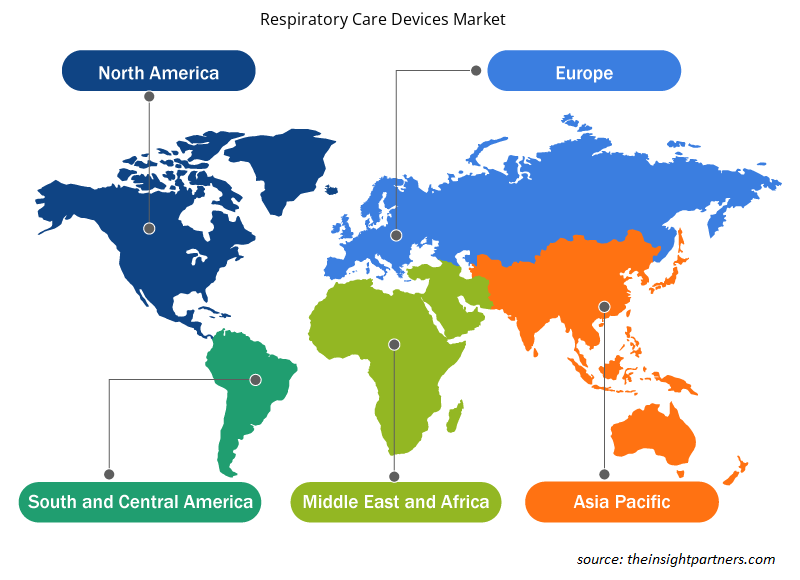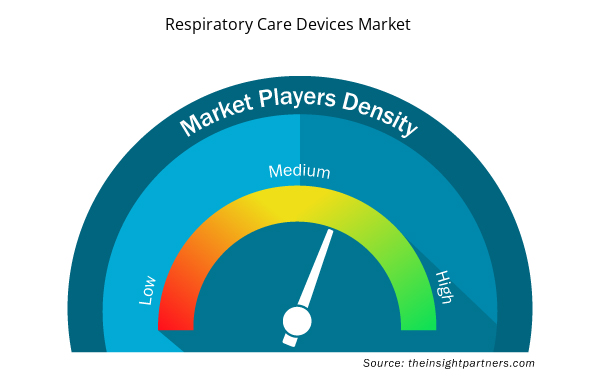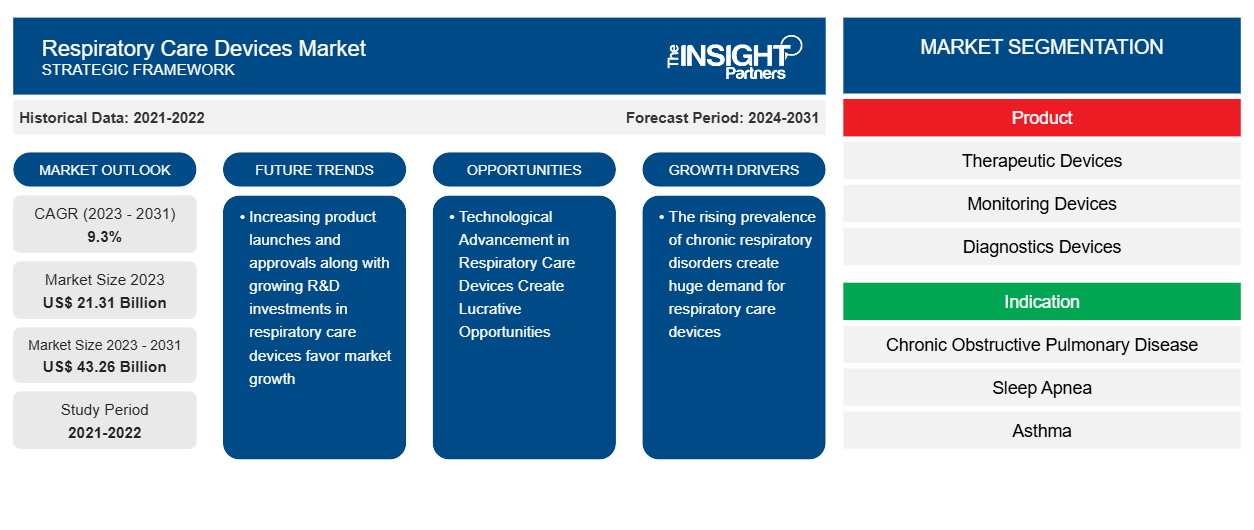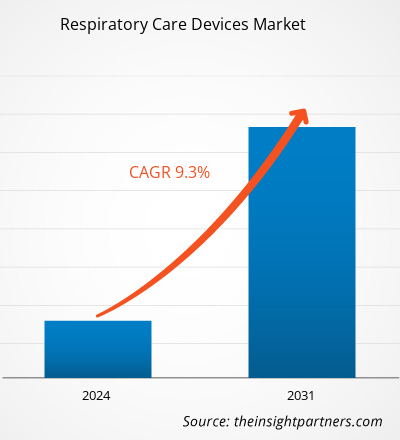呼吸护理设备市场规模预计将从 2023 年的 213.1 亿美元增至 2031 年的 432.6 亿美元。预计该市场在 2023-2031 年期间的复合年增长率为 9.3%。移动/数字呼吸护理设备的日益普及以及向基于价值的技术解决方案的范式转变可能仍是市场的主要趋势。
呼吸护理设备市场分析
慢性阻塞性肺病、哮喘、流感等呼吸道疾病的患病率不断上升,产品上市和批准数量不断增加,以及呼吸护理设备研发投资不断增加,是推动呼吸护理设备市场增长的主要因素。此外,对家庭护理治疗设备的需求不断增长以及呼吸护理设备的技术进步预计将为市场增长创造丰厚的机会。此外,移动/数字呼吸护理设备的日益普及以及向基于价值的技术解决方案的范式转变是推动市场增长的趋势因素。
呼吸护理设备市场概况
呼吸护理设备市场的发展受到 COPD、哮喘、流感等呼吸系统疾病患病率上升、产品上市和批准数量增加以及呼吸护理设备研发投资增加的推动。此外,对家庭护理治疗设备的需求不断增长以及呼吸护理设备的技术进步预计将为市场增长创造丰厚的机会。北美主导呼吸护理设备市场,美国领先北美市场。在 COVID-19 大流行期间,美国食品药品监督管理局 (FDA) 采取了重大措施来增加呼吸设备的可用性,包括呼吸机、脉搏血氧仪、氧气浓缩器和其他设备和配件。然而,由于来自中国和印度的国际参与者的投资不断增加、各国政府支持力度不断加强、老年人口激增、污染水平不断上升以及医疗保健基础设施不断进步,预计亚太地区将实现显着增长率。因此,该地区为呼吸护理设备市场参与者在预测期内提供了巨大的增长潜力。
定制此报告以满足您的需求
您可以免费定制任何报告,包括本报告的部分内容、国家级分析、Excel 数据包,以及为初创企业和大学提供优惠和折扣
- 获取此报告的关键市场趋势。这个免费样品将包括数据分析,从市场趋势到估计和预测。
呼吸护理设备市场驱动因素和机遇
传染性呼吸道疾病发病率上升利好市场
传染性呼吸道疾病给全球医疗体系带来越来越重的负担。传染性呼吸道疾病可由多种与免疫缺陷相关的因素诱发。大多数传染性呼吸道疾病通过粘液和唾液在人与人之间传播,由可感染呼吸系统的微生物引起。传染性呼吸道疾病的严重程度从轻微到严重不等。传染性呼吸道疾病包括一系列疾病,例如结核病 (TB)、COVID-19、流感、白喉、麻疹、肺炎、百日咳、呼吸道合胞病毒 (RSV) 等。近年来,COVID-19 是全球死亡率最高的疾病。在上述传染性呼吸道疾病中,结核病在 COVID-19 大流行之前就位居高发病榜首。例如,根据世界卫生组织 (WHO) 的数据,结核病是第 13 大死亡原因,也是仅次于 COVID-19 的第二大传染病。 2021年10月,世卫组织表示,2022年全球约有1060万人感染结核病,其中包括580万男性、350万女性和130万儿童。
呼吸护理设备的技术进步创造了丰厚的机遇
技术进步使专家诊断和患者自我护理变得更加容易。例如,吸入器可分配近 90% 的呼吸系统疾病处方药。智能吸入器是帮助呼吸系统疾病患者获取药物并将重要信息反馈给医生的最新工具。智能吸入器嵌入了 AI 技术,可收集数据并监测患者病情。目前正在测试该技术,以提醒用户注意潜在的环境触发因素并提醒他们按时服药。临床医生和医生可以使用这些智能吸入器收集的数据来更好地了解每个患者的需求。此外,市场参与者可以关注以下趋势以挖掘这些增长机会:
- 能够提供反馈和支持的智能吸入器:制药公司可以与创新型初创企业合作或建立伙伴关系,这些企业提供有关吸入器技术的实时反馈,并使用声学技术向患者输送药物。
- 创新耐用的氧气浓缩器:健康技术公司和创新者可以合作探索生产用于医院和家庭的改进、稳定且易于操作的氧气浓缩器的机会。
呼吸护理设备市场报告细分分析
有助于得出呼吸护理设备市场分析的关键部分是产品、适应症和最终用户。
- 根据产品,呼吸护理设备市场细分为治疗设备、监测设备、诊断设备以及耗材和配件。治疗设备进一步细分为气道正压通气 (PAP) 设备、氧气浓缩器、呼吸机、吸入器、雾化器、加湿器和其他。治疗设备部门在 2023 年占据了最大的市场份额。
- 根据适应症,市场分为神经性慢性阻塞性肺病 (COPD)、睡眠呼吸暂停、哮喘、传染病等。慢性阻塞性肺病 (COPD) 领域在 2023 年占据了最大的市场份额。
- 就最终用户而言,市场分为医院、家庭护理和门诊护理。医院部门在 2023 年占据了相当大的市场份额。
呼吸护理设备市场份额(按地区)分析
呼吸护理设备市场报告的地理范围主要分为五个地区:北美、亚太、欧洲、中东和非洲、南美和中美。
由于 COVID-19 的迅速蔓延,北美占据了市场主导地位,慢性阻塞性肺病 (COPD) 和哮喘患病率上升、老年人口增加以及呼吸护理设备研发不断增加是推动市场增长的一些主要因素。在加拿大和墨西哥,由于呼吸系统疾病病例不断增加以及领先组织不断推出各种呼吸护理设备,市场可能会迎来增长机会。预计亚太地区未来几年将以最高的复合年增长率增长。
呼吸护理设备市场区域洞察
Insight Partners 的分析师已详尽解释了预测期内影响呼吸护理设备市场的区域趋势和因素。本节还讨论了北美、欧洲、亚太地区、中东和非洲以及南美和中美洲的呼吸护理设备市场细分和地理位置。

- 获取呼吸护理设备市场的区域特定数据
呼吸护理设备市场报告范围
| 报告属性 | 细节 |
|---|---|
| 2023 年的市场规模 | 213.1亿美元 |
| 2031 年市场规模 | 432.6亿美元 |
| 全球复合年增长率(2023 - 2031) | 9.3% |
| 史料 | 2021-2022 |
| 预测期 | 2024-2031 |
| 涵盖的领域 | 按产品
|
| 覆盖地区和国家 | 北美
|
| 市场领导者和主要公司简介 |
|
呼吸护理设备市场参与者密度:了解其对业务动态的影响
呼吸护理设备市场正在快速增长,这得益于终端用户需求的不断增长,而这些需求又源于消费者偏好的不断变化、技术进步以及对产品优势的认识不断提高等因素。随着需求的增加,企业正在扩大其产品范围,进行创新以满足消费者的需求,并利用新兴趋势,从而进一步推动市场增长。
市场参与者密度是指在特定市场或行业内运营的企业或公司的分布情况。它表明在给定市场空间中,相对于其规模或总市场价值,有多少竞争对手(市场参与者)存在。
在呼吸护理设备市场运营的主要公司有:
- 荷兰皇家飞利浦公司
- 瑞思迈公司
- 美敦力
- 马西莫
- 赛默飞世尔科技公司
- 德尔格股份公司
免责声明:上面列出的公司没有按照任何特定顺序排列。

- 了解呼吸护理设备市场的主要参与者概况
呼吸护理设备市场新闻和最新发展
呼吸护理设备市场通过收集主要和次要研究后的定性和定量数据进行评估,其中包括重要的公司出版物、协会数据和数据库。呼吸护理设备市场的一些发展情况如下:
- ResMed 在美国推出了 AirCurve 11 系列双水平气道正压装置。该装置使用吸气气道正压 (IPAP) 和呼气气道正压 (EPAP)。结合数字技术,AirCurve 11 旨在帮助提供者在患者开始和继续治疗的同时治疗睡眠呼吸暂停。(来源:ResMed,通讯,2024 年 2 月)
- Getinge 在印度推出了 Servo-c 机械呼吸机。Servo-c 旨在满足患者的呼吸需求,提供肺保护性治疗工具。通过此次发布,该公司希望让印度的医院能够负担得起医疗保健解决方案。(来源:Getinge,简报,2024 年 2 月)
- Inspira Technologies OXY BHN Ltd. 为其 INSPIRA ART 医疗设备系列推出了一次性血氧套件。该套件还旨在与其他各种生命支持机器兼容,进军一次性灌注系统市场。(来源:Inspira Technologies,新闻稿,2024 年 1 月)
呼吸护理设备市场报告覆盖范围和交付成果
“呼吸护理设备市场规模和预测(2021-2031)”报告对市场进行了详细分析,涵盖以下领域:
- 呼吸护理设备市场规模及全球、区域和国家层面所有主要细分市场的预测
- 呼吸护理设备市场趋势以及市场动态,如驱动因素、限制因素和关键机遇
- 详细的 PEST/波特五力分析和 SWOT 分析
- 呼吸护理设备市场分析涵盖主要市场趋势、全球和区域框架、主要参与者、法规和最新市场发展
- 行业格局和竞争分析,涵盖市场集中度、热图分析、知名参与者以及呼吸护理设备市场的最新发展
- 详细的公司简介
- 历史分析(2 年)、基准年、预测(7 年)及复合年增长率
- PEST 和 SWOT 分析
- 市场规模价值/数量 - 全球、区域、国家
- 行业和竞争格局
- Excel 数据集


- Travel Vaccines Market
- Clinical Trial Supplies Market
- Tortilla Market
- Quantitative Structure-Activity Relationship (QSAR) Market
- Battery Testing Equipment Market
- GNSS Chip Market
- High Speed Cable Market
- Saudi Arabia Drywall Panels Market
- Online Exam Proctoring Market
- Intraoperative Neuromonitoring Market

Report Coverage
Revenue forecast, Company Analysis, Industry landscape, Growth factors, and Trends

Segment Covered
This text is related
to segments covered.

Regional Scope
North America, Europe, Asia Pacific, Middle East & Africa, South & Central America

Country Scope
This text is related
to country scope.
常见问题
North America region dominated the Respiratory care devices market in 2023
The rising prevalence of respiratory diosrders such as COPD, asthma, influenza, and others and increasing number of product launches and approvals along with suring R&D investments in respiratory care devices the driving factors impacting the Respiratory care devices market
Growing adoption of mobile/digital respiratory care devices and paradigm shift towards value-based technology solutions are the future trends of the Respiratory care devices market
The leading players operating in the Respiratory care devices market includes Koninklijke Philips N.V., ResMed Inc, Medtronic, Masimo, THERMO FISHER SCIENTIFIC INC., Dragerwerk AG & Co. KGaA, Invacare Corporation, Getinge AB., Nihon Kohden Corporation, Air Liquide, Teleflex Incorporated among others
The estimated value of the Respiratory care devices market by 2031 is US$ 43.26 Bn
The expected CAGR of the Respiratory care devices market is 9.3%
Trends and growth analysis reports related to Life Sciences : READ MORE..
The Insight Partners performs research in 4 major stages: Data Collection & Secondary Research, Primary Research, Data Analysis and Data Triangulation & Final Review.
- Data Collection and Secondary Research:
As a market research and consulting firm operating from a decade, we have published and advised several client across the globe. First step for any study will start with an assessment of currently available data and insights from existing reports. Further, historical and current market information is collected from Investor Presentations, Annual Reports, SEC Filings, etc., and other information related to company’s performance and market positioning are gathered from Paid Databases (Factiva, Hoovers, and Reuters) and various other publications available in public domain.
Several associations trade associates, technical forums, institutes, societies and organization are accessed to gain technical as well as market related insights through their publications such as research papers, blogs and press releases related to the studies are referred to get cues about the market. Further, white papers, journals, magazines, and other news articles published in last 3 years are scrutinized and analyzed to understand the current market trends.
- Primary Research:
The primarily interview analysis comprise of data obtained from industry participants interview and answers to survey questions gathered by in-house primary team.
For primary research, interviews are conducted with industry experts/CEOs/Marketing Managers/VPs/Subject Matter Experts from both demand and supply side to get a 360-degree view of the market. The primary team conducts several interviews based on the complexity of the markets to understand the various market trends and dynamics which makes research more credible and precise.
A typical research interview fulfils the following functions:
- Provides first-hand information on the market size, market trends, growth trends, competitive landscape, and outlook
- Validates and strengthens in-house secondary research findings
- Develops the analysis team’s expertise and market understanding
Primary research involves email interactions and telephone interviews for each market, category, segment, and sub-segment across geographies. The participants who typically take part in such a process include, but are not limited to:
- Industry participants: VPs, business development managers, market intelligence managers and national sales managers
- Outside experts: Valuation experts, research analysts and key opinion leaders specializing in the electronics and semiconductor industry.
Below is the breakup of our primary respondents by company, designation, and region:

Once we receive the confirmation from primary research sources or primary respondents, we finalize the base year market estimation and forecast the data as per the macroeconomic and microeconomic factors assessed during data collection.
- Data Analysis:
Once data is validated through both secondary as well as primary respondents, we finalize the market estimations by hypothesis formulation and factor analysis at regional and country level.
- Macro-Economic Factor Analysis:
We analyse macroeconomic indicators such the gross domestic product (GDP), increase in the demand for goods and services across industries, technological advancement, regional economic growth, governmental policies, the influence of COVID-19, PEST analysis, and other aspects. This analysis aids in setting benchmarks for various nations/regions and approximating market splits. Additionally, the general trend of the aforementioned components aid in determining the market's development possibilities.
- Country Level Data:
Various factors that are especially aligned to the country are taken into account to determine the market size for a certain area and country, including the presence of vendors, such as headquarters and offices, the country's GDP, demand patterns, and industry growth. To comprehend the market dynamics for the nation, a number of growth variables, inhibitors, application areas, and current market trends are researched. The aforementioned elements aid in determining the country's overall market's growth potential.
- Company Profile:
The “Table of Contents” is formulated by listing and analyzing more than 25 - 30 companies operating in the market ecosystem across geographies. However, we profile only 10 companies as a standard practice in our syndicate reports. These 10 companies comprise leading, emerging, and regional players. Nonetheless, our analysis is not restricted to the 10 listed companies, we also analyze other companies present in the market to develop a holistic view and understand the prevailing trends. The “Company Profiles” section in the report covers key facts, business description, products & services, financial information, SWOT analysis, and key developments. The financial information presented is extracted from the annual reports and official documents of the publicly listed companies. Upon collecting the information for the sections of respective companies, we verify them via various primary sources and then compile the data in respective company profiles. The company level information helps us in deriving the base number as well as in forecasting the market size.
- Developing Base Number:
Aggregation of sales statistics (2020-2022) and macro-economic factor, and other secondary and primary research insights are utilized to arrive at base number and related market shares for 2022. The data gaps are identified in this step and relevant market data is analyzed, collected from paid primary interviews or databases. On finalizing the base year market size, forecasts are developed on the basis of macro-economic, industry and market growth factors and company level analysis.
- Data Triangulation and Final Review:
The market findings and base year market size calculations are validated from supply as well as demand side. Demand side validations are based on macro-economic factor analysis and benchmarks for respective regions and countries. In case of supply side validations, revenues of major companies are estimated (in case not available) based on industry benchmark, approximate number of employees, product portfolio, and primary interviews revenues are gathered. Further revenue from target product/service segment is assessed to avoid overshooting of market statistics. In case of heavy deviations between supply and demand side values, all thes steps are repeated to achieve synchronization.
We follow an iterative model, wherein we share our research findings with Subject Matter Experts (SME’s) and Key Opinion Leaders (KOLs) until consensus view of the market is not formulated – this model negates any drastic deviation in the opinions of experts. Only validated and universally acceptable research findings are quoted in our reports.
We have important check points that we use to validate our research findings – which we call – data triangulation, where we validate the information, we generate from secondary sources with primary interviews and then we re-validate with our internal data bases and Subject matter experts. This comprehensive model enables us to deliver high quality, reliable data in shortest possible time.


 获取此报告的免费样本
获取此报告的免费样本